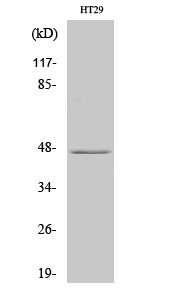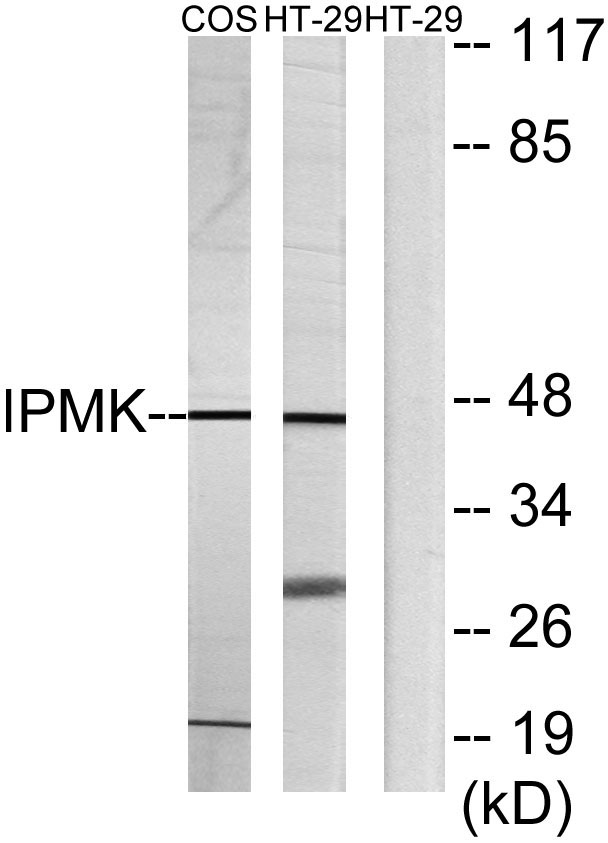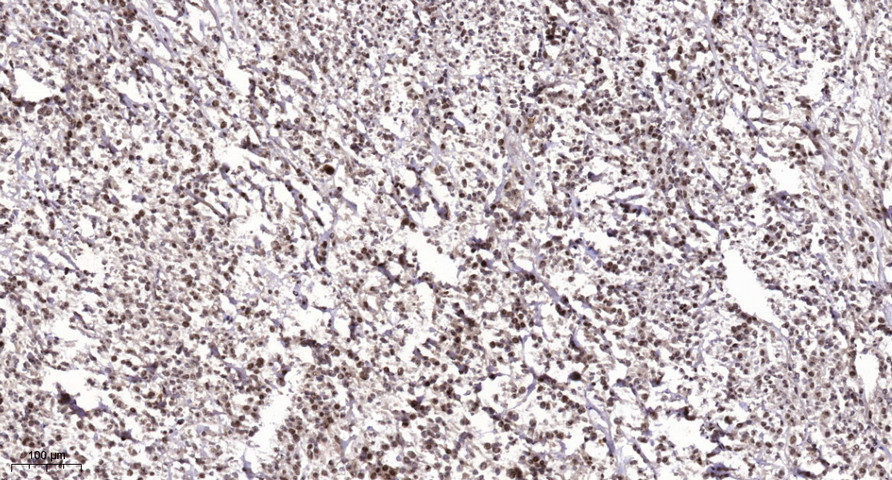IPMK Polyclonal Antibody
- Catalog No.:YT2384
- Applications:WB;IHC;IF;ELISA
- Reactivity:Human;Mouse;Rat;Monkey
- Target:
- IPMK
- Fields:
- >>Inositol phosphate metabolism;>>Metabolic pathways;>>Phosphatidylinositol signaling system
- Gene Name:
- IPMK
- Protein Name:
- Inositol polyphosphate multikinase
- Human Gene Id:
- 253430
- Human Swiss Prot No:
- Q8NFU5
- Mouse Gene Id:
- 69718
- Mouse Swiss Prot No:
- Q7TT16
- Rat Gene Id:
- 171458
- Rat Swiss Prot No:
- Q99NI4
- Immunogen:
- The antiserum was produced against synthesized peptide derived from human IPMK. AA range:311-360
- Specificity:
- IPMK Polyclonal Antibody detects endogenous levels of IPMK protein.
- Formulation:
- Liquid in PBS containing 50% glycerol, 0.5% BSA and 0.02% sodium azide.
- Source:
- Polyclonal, Rabbit,IgG
- Dilution:
- WB 1:500 - 1:2000. IHC 1:100 - 1:300. ELISA: 1:40000.. IF 1:50-200
- Purification:
- The antibody was affinity-purified from rabbit antiserum by affinity-chromatography using epitope-specific immunogen.
- Concentration:
- 1 mg/ml
- Storage Stability:
- -15°C to -25°C/1 year(Do not lower than -25°C)
- Other Name:
- IPMK;IMPK;Inositol polyphosphate multikinase;Inositol 1;3,4,6-tetrakisphosphate 5-kinase
- Observed Band(KD):
- 47kD
- Background:
- This gene encodes a member of the inositol phosphokinase family. The encoded protein has 3-kinase, 5-kinase and 6-kinase activities on phosphorylated inositol substrates. The encoded protein plays an important role in the biosynthesis of inositol 1,3,4,5,6-pentakisphosphate, and has a preferred 5-kinase activity. This gene may play a role in nuclear mRNA export. Pseudogenes of this gene are located on the long arm of chromosome 13 and the short arm of chromosome 19. [provided by RefSeq, Dec 2010],
- Function:
- catalytic activity:ATP + 1D-myo-inositol 1,4,5,6-tetrakisphosphate = ADP + 1D-myo-inositol 1,3,4,5,6-pentakisphosphate.,catalytic activity:ATP + 1D-myo-inositol 1,4,5-trisphosphate = ADP + 1D-myo-inositol 1,4,5,6-tetrakisphosphate.,function:Inositol phosphate kinase with a broad substrate specificity. Has a preference for inositol-1,4,5-trisphosphate (Ins(1,4,5)P3) and inositol 1,3,4,6-tetrakisphosphate (Ins(1,3,4,6)P4).,similarity:Belongs to the inositol phosphokinase (IPK) family.,tissue specificity:Ubiquitous, with the highest expression in skeletal muscle, liver, placenta, lung, peripheral blood leukocytes, kidney, spleen and colon.,
- Subcellular Location:
- Nucleus .
- Expression:
- Ubiquitous, with the highest expression in skeletal muscle, liver, placenta, lung, peripheral blood leukocytes, kidney, spleen and colon.
- June 19-2018
- WESTERN IMMUNOBLOTTING PROTOCOL
- June 19-2018
- IMMUNOHISTOCHEMISTRY-PARAFFIN PROTOCOL
- June 19-2018
- IMMUNOFLUORESCENCE PROTOCOL
- September 08-2020
- FLOW-CYTOMEYRT-PROTOCOL
- May 20-2022
- Cell-Based ELISA│解您多样本WB检测之困扰
- July 13-2018
- CELL-BASED-ELISA-PROTOCOL-FOR-ACETYL-PROTEIN
- July 13-2018
- CELL-BASED-ELISA-PROTOCOL-FOR-PHOSPHO-PROTEIN
- July 13-2018
- Antibody-FAQs
- Products Images

- Western Blot analysis of various cells using IPMK Polyclonal Antibody cells nucleus extracted by Minute TM Cytoplasmic and Nuclear Fractionation kit (SC-003,Inventbiotech,MN,USA).

- Western blot analysis of lysates from HT-29 and COS7 cells, using IPMK Antibody. The lane on the right is blocked with the synthesized peptide.

- Immunohistochemical analysis of paraffin-embedded human Colon cancer. 1, Antibody was diluted at 1:200(4° overnight). 2, Tris-EDTA,pH9.0 was used for antigen retrieval. 3,Secondary antibody was diluted at 1:200(room temperature, 45min).



